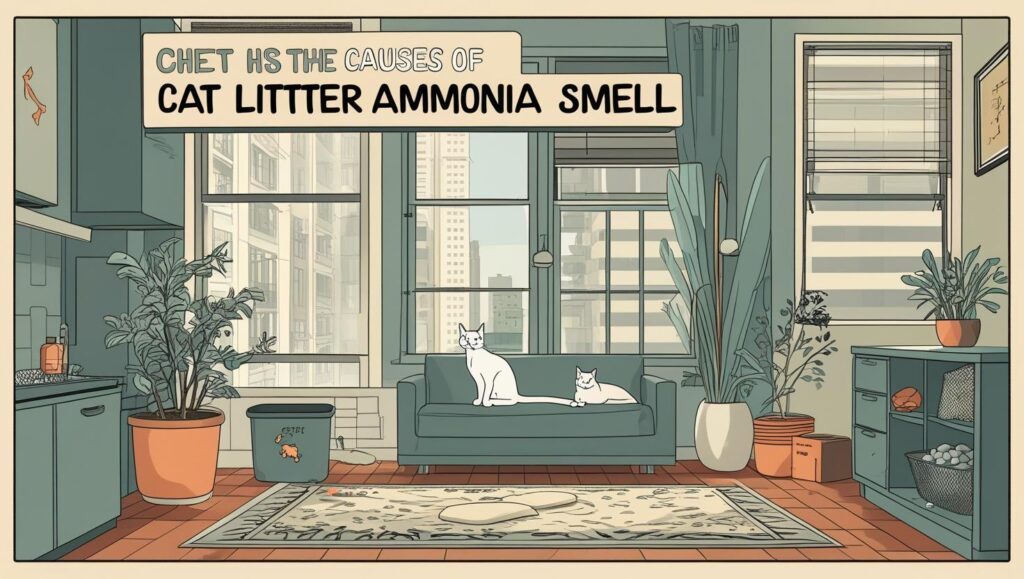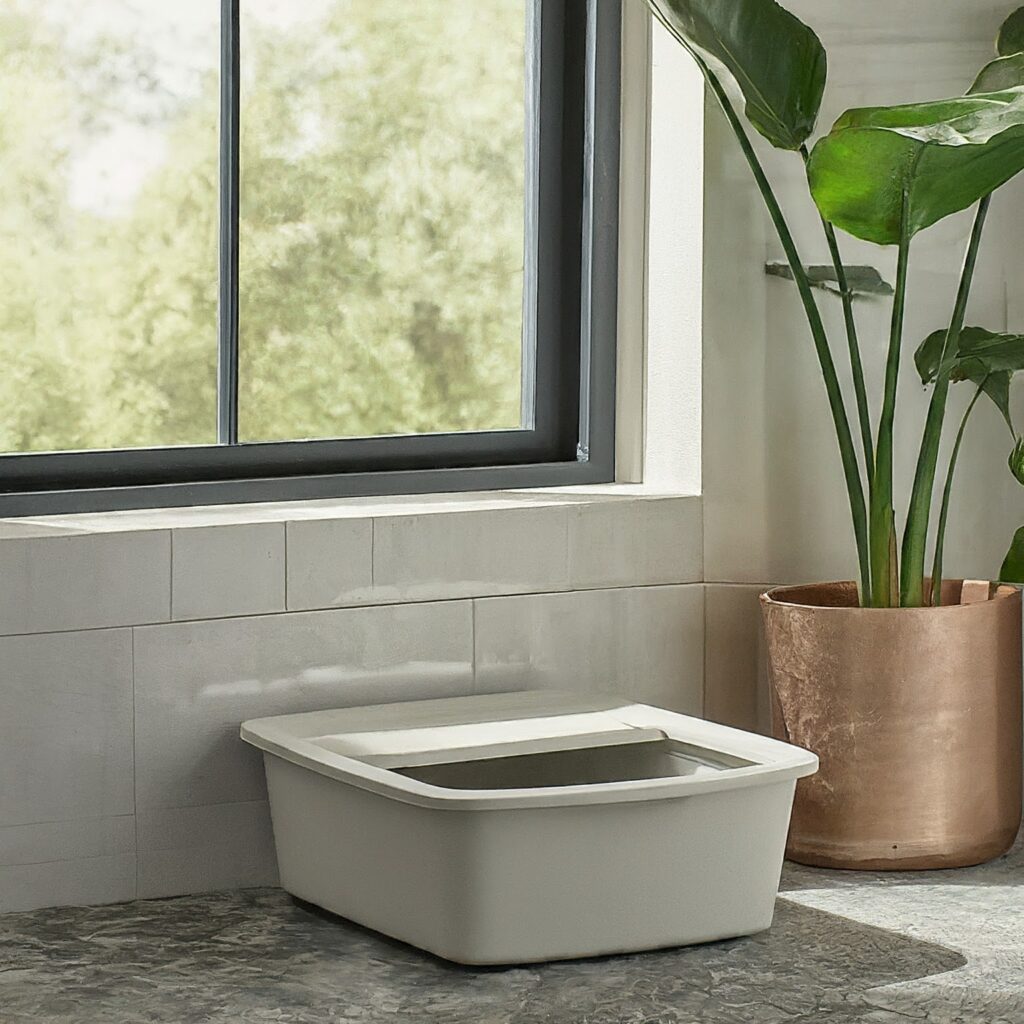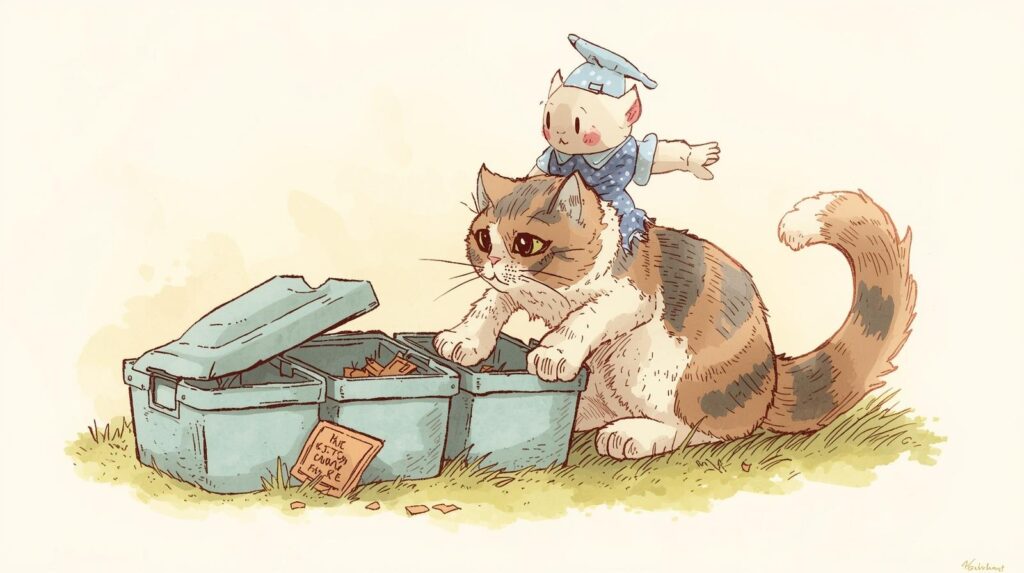
If you’ve noticed a strong, sharp cat litter ammonia smell in your home, you’re not alone. This odor is usually caused by the breakdown of urea in cat urine, which releases ammonia gas. While a mild smell is normal, an intense odor can mean your litter needs better maintenance, your cat is over-concentrating urine, or the ventilation in your home is poor. Ignoring it isn’t just unpleasant—it can also be bad for your health.
In this article, we’ll explain why cat litter ammonia smell happens, how it affects cats and humans, and proven ways to eliminate it while keeping your home fresh. One important thing to note is that you should read this blog thoroughly and continue to the end. Here you will get a lot of information about your dear friend and your health, which I have created for you with great difficulty.
Table of Contents
Is It Normal for Cat Urine to Smell Like Ammonia?
Yes, it’s normal for cat urine to have a mild ammonia smell. Cats have very concentrated urine, and when it sits in a litter box, bacteria break down urea into ammonia. This process creates that sharp odor you recognise.
However, if the smell is overpowering, it may mean:
- The litter is overdue for cleaning
- Your cat is dehydrated
- There’s poor airflow in the litter area
- Your cat may have a urinary tract infection (UTI)
What Causes Cat Litter Ammonia Smell?

The cat litter ammonia smell comes from a natural process that happens when your cat urinates. Cat urine contains urea, a waste product that quickly breaks down into ammonia when bacteria start working on it. The stronger and more concentrated your cat’s urine, the faster this sharp smell develops.
Several factors can make the odor worse:
- Infrequent cleaning – If you don’t scoop the litter box daily, ammonia levels rise quickly.
- Poor ventilation – A closed or cramped space traps odors and makes them stronger.
- Low-quality cat litter – Some types absorb moisture poorly, allowing bacteria to grow faster.
- Dehydration in cats – If your cat drinks less water, its urine becomes more concentrated and pungent.
- Multiple cats using one box – More urine means ammonia builds up faster.
Many cat parents search for this topic because they want to know how to get rid of an ammonia smell in a litter box without harming their pets. Understanding the source of the odor is the first step to choosing the right cleaning method, odour-neutralising products, and even diet changes to reduce the smell long-term.
Can Ammonia from Cat Litter Make You Sick?
Yes — high levels of cat litter ammonia smell can be harmful, especially in poorly ventilated spaces. Ammonia is a strong chemical gas produced when bacteria break down urea in cat urine. While small amounts are common in homes with cats, excessive exposure can affect both humans and pets.
Here’s what most readers are searching for when they ask this question:
- Can breathing ammonia from cat litter cause headaches or dizziness?
- Is cat litter ammonia dangerous for babies, elderly people, or those with asthma?
- What are the symptoms of ammonia inhalation from cat litter?
Health Risks from Cat Litter Ammonia
Prolonged exposure to strong ammonia fumes can lead to:
- Respiratory irritation – coughing, wheezing, or shortness of breath.
- Burning eyes and throat – ammonia gas can irritate mucous membranes.
- Headaches and nausea – caused by continuous inhalation of the odor.
- Worsening allergies or asthma – ammonia can trigger flare-ups in sensitive people.
Who Is Most at Risk?
- Infants and toddlers – Their lungs are still developing, making them more sensitive to chemicals.
- Elderly individuals – Often have weaker immune systems or pre-existing respiratory issues.
- People with asthma or chronic lung problems – Ammonia can make symptoms worse.
- Pregnant women – Strong fumes may cause discomfort or nausea.
To stay safe, scoop the litter box daily, keep the area well-ventilated, and choose low-dust, odor-controlling litter.
Quick Fixes to Remove Cat Litter Ammonia Smell
When your home starts smelling like cat litter ammonia, you need solutions that work instantly — not weeks from now. The strong ammonia odor comes from bacteria breaking down your cat’s urine, so the key is neutralizing and removing it before it builds up.
Here’s what readers usually search for when looking for quick fixes:
- How do I get rid of ammonia smell from cat litter instantly?
- What neutralizes ammonia in cat urine?
- DIY ways to stop cat litter from smelling like ammonia
Scoop the Litter Box More Often
Ammonia builds up quickly in soiled litter. Scoop at least twice a day to prevent bacteria from creating that strong smell. This is the simplest and most effective step.
Replace the Litter Completely
If the odor is strong, it’s time for a full litter change. Empty the litter box, wash it with mild soap (never bleach + ammonia together — it creates toxic fumes), and add fresh litter.
Use an Ammonia-Neutralizing Product
Sprinkle baking soda or use a commercial ammonia-blocking litter additive. Baking soda works by balancing pH and neutralizing odor before it becomes noticeable.
Improve Ventilation
Place the litter box in a well-aired area, or use a small fan or air purifier. Better airflow means ammonia gas won’t linger in your home.
Switch to a High-Quality, Odor-Control Litter
Look for litters labeled “ammonia blocking,” “odor shield,” or made with activated charcoal. These trap ammonia molecules before they spread.
Wash the Litter Box Weekly
Even if you scoop daily, urine residue can cling to the box’s surface. Use a pet-safe cleaner or a vinegar-water solution to deep clean at least once a week.
Try an Enzymatic Cleaner
Enzymatic sprays break down the proteins in cat urine that cause odor. Spray the inside of the litter box before adding fresh litter for extra odor protection.
Can I Put Baking Soda in Cat Litter?
Yes, you can put baking soda in cat litter — and it’s actually one of the easiest and safest ways to control cat litter ammonia smell. Baking soda is a natural deodorizer that works by neutralizing acidic and alkaline odors, including the strong scent caused by ammonia in cat urine.
However, the way you use baking soda matters. Sprinkling too much directly on top of the litter may make your cat avoid the litter box due to the change in texture or scent. Instead, sprinkle a thin, even layer (about 2–3 tablespoons) at the bottom of the box before adding fresh litter. This method traps odor at its source, rather than just masking it.
Why Baking Soda Works for Ammonia Smell
- Odor Neutralization – It doesn’t just cover up smells; it changes the pH balance to reduce ammonia gases.
- Non-toxic for Cats – When used in small amounts, it’s safe and chemical-free.
- Budget-friendly – Much cheaper than speciality litter additives.
Things to Keep in Mind
- Don’t Overdo It – Too much baking soda can make the litter dusty, which may cause respiratory irritation for sensitive cats.
- Pair with Regular Cleaning – Even with baking soda, you’ll still need to scoop daily and replace litter often to keep cat litter ammonia smell under control.
- Avoid Scented Baking Soda – Stick to plain, unscented baking soda, as artificial scents can be irritating to cats.
Pro Tip: For a long-term solution, combine baking soda with a high-quality clumping litter and a regular cleaning schedule. This ensures both freshness and comfort for your cat.
Is It Bad to Sleep with Cat Litter in Your Room?

Many cat owners keep their pet’s litter box in the bedroom for convenience, but this can raise important health and comfort concerns. While occasional proximity may not cause severe harm, regularly sleeping in a room with a cat litter ammonia smell can have negative effects.
Here’s why it might be a problem:
- Ammonia exposure: Cat urine contains urea, which breaks down into ammonia. In a small, poorly ventilated room, ammonia can build up and irritate your eyes, throat, and lungs.
- Respiratory risks: People with asthma, allergies, or other breathing issues are more likely to experience coughing, wheezing, or shortness of breath.
- Odor discomfort: Even mild ammonia smells can make it harder to relax and enjoy quality sleep.
- Bacterial spread: Scooping daily helps, but litter dust and microscopic waste particles can circulate in the air, especially if the litter isn’t clumping properly.
What readers search for here:
Many pet owners want to know if sleeping near a litter box is safe, how to reduce the ammonia smell, and whether ventilation or odor-control products can help. The answer is yes—it can be safer if you take preventive measures.
Tips for safer bedroom litter box placement:
- Ventilation is key – Keep a window open or use an air purifier to prevent ammonia buildup.
- Daily cleaning – Scoop waste at least twice a day to minimize odor.
- Use odor-control litter – Certain clumping litters trap moisture and reduce smell.
- Seal the box – A covered litter box or one with a carbon filter can help reduce airborne particles.
If your cat must share your bedroom space, combining frequent cleaning with strong ventilation can significantly reduce the cat litter ammonia smell and help you breathe easier.
Can Breathing in Cat Litter Harm You?

Breathing in dust or cat litter ammonia smell over time can cause health problems, especially if your litter box is not cleaned regularly. When cat urine sits in the litter for too long, it breaks down into ammonia gas. In small amounts, ammonia may just cause a strong odor, but in larger amounts or with constant exposure, it can irritate your eyes, throat, and lungs.
Many readers search for this topic because they notice they’re sneezing, coughing, or experiencing watery eyes after being near the litter box. If you have asthma, allergies, or other breathing issues, the cat litter ammonia smell can make your symptoms worse.
Long-term exposure can lead to:
- Persistent coughing or throat irritation
- Headaches from inhaling strong ammonia fumes
- Aggravated asthma or breathing difficulties
- Higher risk of respiratory infections due to weakened lung function
Tip for reducing the risk: Always place the litter box in a well-ventilated area, scoop waste daily, and use low-dust or natural litter. If the smell is strong even after cleaning, it might be time to try a better odor-control litter or a covered litter box with built-in ventilation.
Remember — a clean litter box is not just about keeping odors away; it’s also about keeping you and your cat healthy.
Best Cat Litters to Control Ammonia Smell

If you’re tired of that strong cat litter ammonia smell hitting you every time you walk near the litter box, the right type of litter can make all the difference. Some litters are designed specifically to trap ammonia odors before they spread, keeping your home fresher and healthier.
Here are the top types of cat litter that can help control ammonia smell:
- Clumping Clay Litter with Ammonia Blockers
- Brands now use odor-sealing crystals or baking soda to lock in ammonia before it escapes.
- Great for households with multiple cats.
- Silica Gel Crystal Litter
- Absorbs moisture quickly and traps odors inside each crystal.
- Low dust, making it better for people with allergies.
- Natural Plant-Based Litter (Corn, Wheat, or Grass Seed)
- Eco-friendly and often infused with baking soda for odor control.
- Safe if your cat accidentally ingests a small amount while grooming.
- Activated Charcoal-Infused Litter
- Neutralizes ammonia smell naturally.
- Works well for sensitive noses and small spaces.
Extra Tips for Maximum Odor Control:
- Scoop daily — ammonia builds up fast in waste.
- Use a covered litter box with ventilation to trap smells without trapping harmful gases.
- Wash the litter box with mild soap once a week to prevent odor buildup.
With the right litter and cleaning habits, you can drastically cut down on cat litter ammonia smell, making your home more comfortable for both you and your cat.
Extra Tips for Keeping the Air Fresh
Even if you’ve handled the main cause of cat litter ammonia smell, keeping your home smelling fresh takes a little extra care. Cats are sensitive to scents, and strong odors can also affect your comfort and health. Here’s how you can maintain cleaner air around your litter box area and the rest of your home:
Use an Air Purifier with a HEPA & Carbon Filter
A good air purifier with an activated carbon filter can trap ammonia particles, dander, and dust. This not only reduces pet odors but also improves overall air quality, making your home more comfortable for both you and your cat.
Keep the Litter Area Well-Ventilated
Ammonia builds up fastest in closed spaces. Keep windows slightly open or use a small exhaust fan near the cat litter area. Fresh airflow prevents odors from becoming concentrated.
Wash Litter Mats and Surrounding Areas Regularly
Even if you clean the box, litter mats, walls, and the floor around it can hold smells. Washing them with mild, pet-safe cleaners can prevent hidden odor buildup.
Use Odor-Absorbing Items
Place bowls of activated charcoal, baking soda, or even coffee grounds near the litter area. These natural odor absorbers help keep the air fresh without harming your pet.
Avoid Scented Candles or Harsh Sprays
While it’s tempting to mask the smell, many scented candles and sprays contain chemicals that can irritate cats. Stick to natural air fresheners or safe essential oil diffusers (lavender-free for cats).
Groom Your Cat Regularly
Believe it or not, your cat’s fur can carry litter dust and urine particles, contributing to cat litter ammonia smell in your home. Regular brushing and occasional baths (if your cat tolerates them) can reduce odors.
By combining litter maintenance with these air-freshening habits, you can enjoy a cleaner, fresher home without the constant worry of lingering odors.
FAQs-Cat Litter Ammonia Smell
How to get rid of cat litter ammonia smell?
To remove cat litter ammonia smell, scoop the litter box daily, change the cat litter often, and clean it with an enzymatic cleaner. Adding baking soda or using ammonia-blocking litter can also help keep odors away.
Cat litter ammonia smell reddit – what do people suggest?
On Reddit, many cat owners recommend using low-dust clumping litter, cleaning the litter box daily, and improving ventilation. Some also suggest adding a carbon filter to the box to trap smells.
Is cat litter ammonia smell dangerous?
Yes, breathing strong cat litter ammonia smell for a long time can be harmful. It can cause eye irritation, coughing, and headaches. People with asthma or weak lungs should be extra careful.
Is ammonia smell from cat urine dangerous?
Yes, ammonia smell from cat urine can be dangerous if the odor is very strong and you breathe it often. It may lead to throat irritation, nausea, and breathing problems.
Why does my cat’s pee smell like ammonia all of a sudden?
If your cat’s pee suddenly smells like strong ammonia, it could mean the urine is more concentrated. This might happen if your cat isn’t drinking enough water or could be a sign of a urinary tract infection. A vet check is a good idea.
What is the best cat litter for ammonia smell?
The best cat litter for ammonia smell is one that clumps well, controls moisture, and contains odor-absorbing ingredients like activated charcoal or baking soda. Popular choices are clay clumping litter and crystal silica litter.
Can ammonia from cat litter make you sick?
Yes, ammonia from cat litter can make you sick if you’re exposed to high levels for a long time. Symptoms may include eye burning, coughing, dizziness, and in rare cases, lung problems.
What are the symptoms of ammonia poisoning from cat urine?
Signs of ammonia poisoning from cat urine include watery eyes, sore throat, coughing, headaches, chest tightness, and in severe cases, trouble breathing. If you feel these symptoms, get fresh air and seek medical help.
Further reading
Can new litter make a cat sick
Wrapping up
Dealing with a cat litter ammonia smell is not just about keeping your home pleasant—it’s also about protecting your cat’s health and your own. The key is to scoop the litter box daily, choose a high-quality clumping litter, and ensure your cat’s space has proper ventilation. If the smell gets worse suddenly, it could be a sign of a health issue, such as a urinary tract infection, and a vet check-up is a smart move.
Strong odors, especially a sharp ammonia smell from cat urine, can cause discomfort, headaches, and even respiratory irritation over time. This is why prevention is always better than cure—a clean litter box, odor-absorbing products, and routine deep cleaning can make all the difference.
Whether you’re using natural odor control methods or switching to the best cat litter for ammonia smell, the goal is the same: a clean, fresh-smelling space where both you and your feline friend can breathe easy. By combining good cleaning habits, the right products, and a watchful eye on your cat’s health, you can finally say goodbye to cat litter ammonia smell—for good.



